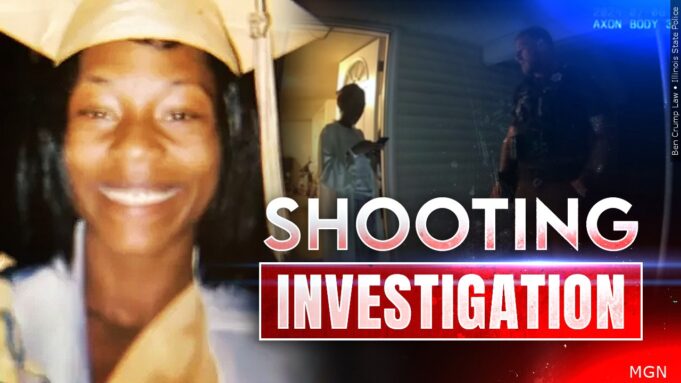CHICAGO—Protests and vigils continue around the country in remembrance of Sonya Massey, a Black woman, whose fatal shooting by a White sheriff’s deputy in her Springfield, Illinois, home after she called 911 for help has drawn national mourning, outrage and reignited calls for federal police reform.
Amidst their grief, Sonya Massey’s family addressed a packed crowd of supporters July 30, at New Mount Pilgrim Missionary Baptist Church in Chicago, expressing gratitude and demanding changes in the department. Standing with the Massey family at the rally were civil rights attorney Ben Crump, Rev. Al Sharpton, Rev. Jesse L. Jackson Sr., social justice leader Tamika D. Mallory and many other Chicago social justice advocates and activists from Chicago.
Ms. Massey’s father responded to reports that Sangamon County Sheriff Jack Campbell, whose deputy killed his daughter on July 6, apologized to the family and community during a gathering at Union Baptist Church in Springfield, according to local media outlets.
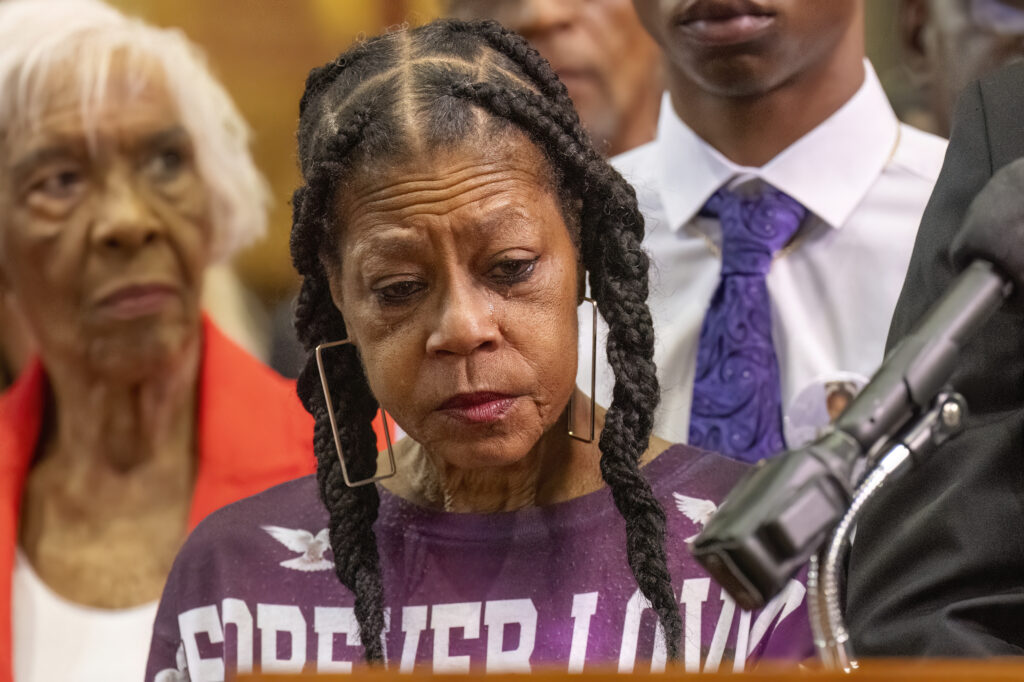
“I understand the sheriff of Sangamon County, he spoke at a rally, and he asked for our forgiveness. Anybody else in our family can forgive him, but I’m not. Because he has my daughter’s blood on his hands,” said James Wilburn as he called for his resignation. “He needs to go.” He also expressed his appreciation for the outpouring of love that his family has received. “I’m amazed at the kind of love that we have shown for one another.”
Ms. Massey, 36, was shot and killed in her home by Sangamon County sheriff’s deputy Sean Grayson in Woodside Township near Springfield, the capital of Illinois.
According to official reports, she had called 911 to report a possible prowler. Deputies Grayson and an unidentified colleague responded, first searching the vicinity before entering her home. An initial conversation about Ms. Massey’s driver’s license and a pot of boiling water escalated when Grayson remarked, “we don’t need a fire.” Ms. Massey went to turn off the stove and the deputies backed away.
When questioned, the deputies cited the boiling water as a threat. Ms. Massey responded, “I rebuke you in the name of Jesus.” Both deputies drew their service pistols, with Grayson threatening to shoot her in the face and shouting, “Drop the (expletive) pot,” before moving closer to her and firing three times, striking the unarmed Ms. Massey in the head and killing her.
According to the U.K.-based, The Guardian, Sonya Massey’s mother called 911 and asked police not to hurt her daughter before her shooting death. “In a third call, Massey’s mother, Donna Massey, reports that her daughter is suffering a ‘mental breakdown’ and tells the dispatcher: ‘I don’t want you guys to hurt her.’ She adds that she fears the police and asks that no officer who is ‘prejudiced’ be sent,” The Guardian reported.
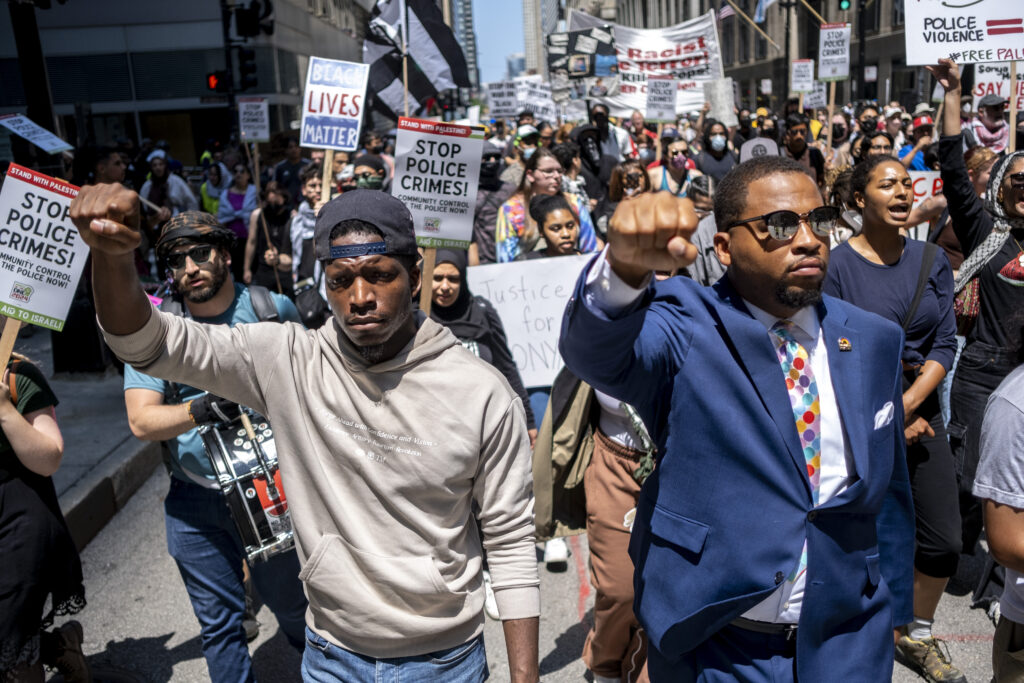
Citing Deputy Grayson’s checkered past, Rev. Sharpton asserted that a 2021 bill that collapsed in the U.S. Senate could have prevented Grayson’s repeated moves to jobs at various police departments where he was getting into disciplinary trouble. He was referring to the George Floyd Justice in Policing Act.
“The crime that we are here tonight to deal with, it did not start the night that Sonya Massey was killed. It started when we allowed the continuous system and a practice that means that a police or law enforcement officer can go from one place to the next, get jobs all over the place, be terminated, fired or suspended for reasons we don’t know,” said Rev. Sharpton at the demonstration. “What was the policeman’s problem, that you would come in and shoot an unarmed woman? And start making up an alibi on tape before the body was cold. There is something wrong with the state of policing in Illinois,” said Rev. Sharpton.
Grayson was terminated from his position after being indicted on multiple charges, including murder. He was also charged with aggravated battery with a firearm and official misconduct. He has pleaded not guilty and is currently in jail without bond. In a unique turn of events, the union representing Sangamon County sheriff’s deputies will not be representing Grayson.
In the aftermath, the sheriff’s department conducted an internal investigation, resulting in Deputy Grayson’s suspension. Initially, the Illinois Fraternal Order of Police Labor Council union advocated for his release from jail, reinstatement and back pay, arguing that his actions were “justified by the perceived threat.” However, amid growing public pressure and scrutiny, the union withdrew its efforts, July 30, to reinstate Grayson.
Justice, outrage and a failure to reform
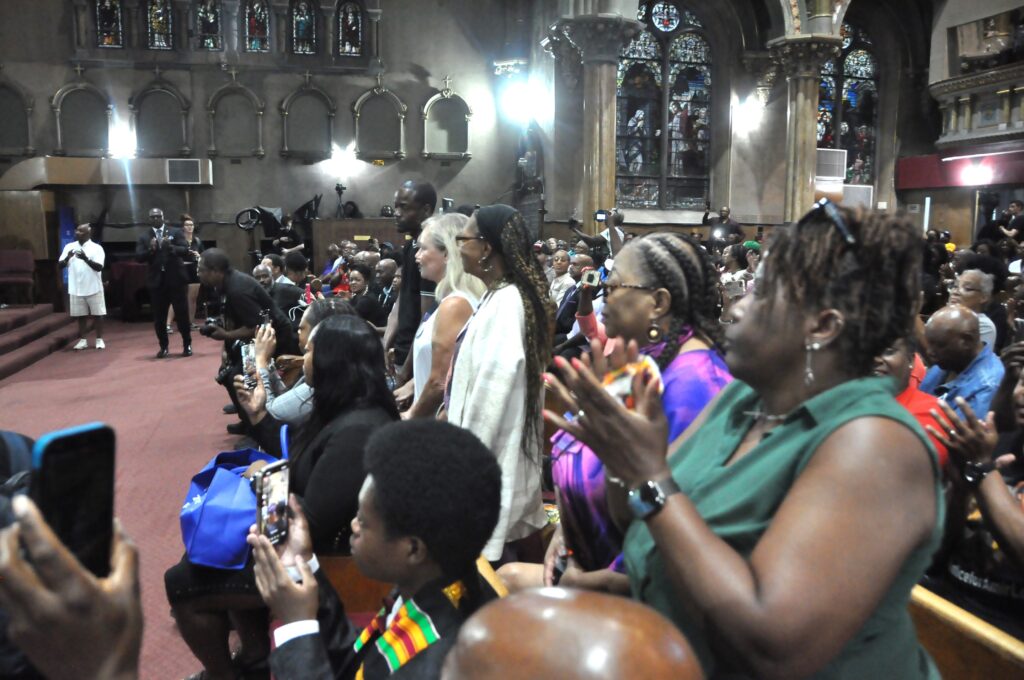
For decades, the Honorable Minister Louis Farrakhan has taught and guided Black people and humanity about true justice and what justice looks like. In quoting his teacher the Most Honorable Elijah Muhammad, Minister Farrakhan has explained that “Justice is the principle of fair dealing.” Leading up to the 20th anniversary of the Million Man March, “Justice or Else,” in 2015, the Minister spoke in several cities around the country about the ongoing incidents of police brutality and deadly law enforcement encounters that disproportionately impact Black communities. He also spoke about the importance of unity as a solution.
The Honorable Elijah Muhammad said, “Our unity is more powerful than the acquisition of a hydrogen or atomic bomb.” We’ve waded in, prayed in, cried in, crawled in; we’ve marched, we’ve—we’ve sat down, and done things that remove dignity from us just to be accepted. … We’ve never tried unity,” the Minister stated in an interview with Felisha Monet of Miami’s WEDR 99 JAMZ radio show, conducted, July 29, 2015, during the “Justice or Else!” tour.
Minister Farrakhan has also warned that these deadly killings of Black people would continue and why.
“The Honorable Elijah Muhammad 50 years ago told us that this persecution would get worse and worse and the plight of our people and our cry for justice would fall on deaf ears and this would force our people to think of that which God wants and that is to separate us from our enemies and to plant us in a land of our own. Because He has purposed to make a great nation out of us as the cornerstone of the Kingdom of God,” Minister Farrakhan stated in a 2016 year-end interview with The Final Call.
Sonya Massey is the latest in a long line of Black men, women and children who have died at the hands of police or in police custody that has gained national attention.
“Because we stood up, over 25 cities across America stood up for justice for Sonya Massey. And we used her words to the police union that tried to exonerate (the officer). We said, to the police union, ‘we rebuke you in the name of Jesus!” Atty. Crump announced to the cheers of the crowd that the union had rescinded its requests on behalf of Deputy Grayson. “That’s what happens when we stand together,” he continued.
“We looked at that video. She was never aggressive. She was never threatening. She never moved fast. She never posed a threat to him at all. But yet, he didn’t see her as human. He didn’t see her as worthy of dignity. He didn’t see her as worthy of respect,” said Atty. Crump.
Attendees came from not just the South and West sides of Chicago, but from throughout the Midwest including Cleveland, Detroit, and Flint, Michigan, to show their support for Sonya Massey’s family.
Sean Grayson, 30, is a former Army service member who has had a troubled career in law enforcement. He served in the Army from 2014 to 2016, where he was separated due to “misconduct (serious offense)” on February 27, 2016, following a DUI incident. After his military service, he worked part-time for four different police departments before joining the Auburn, Illinois, police department in July 2021. He later served as a deputy in Logan County and joined the Sangamon County Sheriff’s Office in May 2023.
Grayson has twice pleaded guilty to DUI charges, one of which occurred during his time in the Army. Despite these offenses, his former sergeant noted in a recommendation letter that aside from the DUI, Grayson had no other issues during his Army tenure. The Sangamon County Sheriff’s Office was aware of both DUI incidents when they hired him, according to Jeff Wilhite, a spokesman for the county.
This information was obtained from his personnel file and the Illinois Law Enforcement Training and Standards Board, as well as documents obtained by The State Journal-Register through a Freedom of Information Act request.
The killing of Ms. Massey has evoked comparisons to other high-profile cases of police brutality involving Black victims, sparking a renewed call for justice and police reform.
“This event to acknowledge, honor, understand and support our beloved sister Queen Sonya Massey was vibrant, real, sad, engaging and necessary. As a Black woman, I want to be able to cook in my house, boil water and call for help if I need it. Who am I going to call?” said Afrika Porter, a Chicago-based social justice activist and entrepreneur.
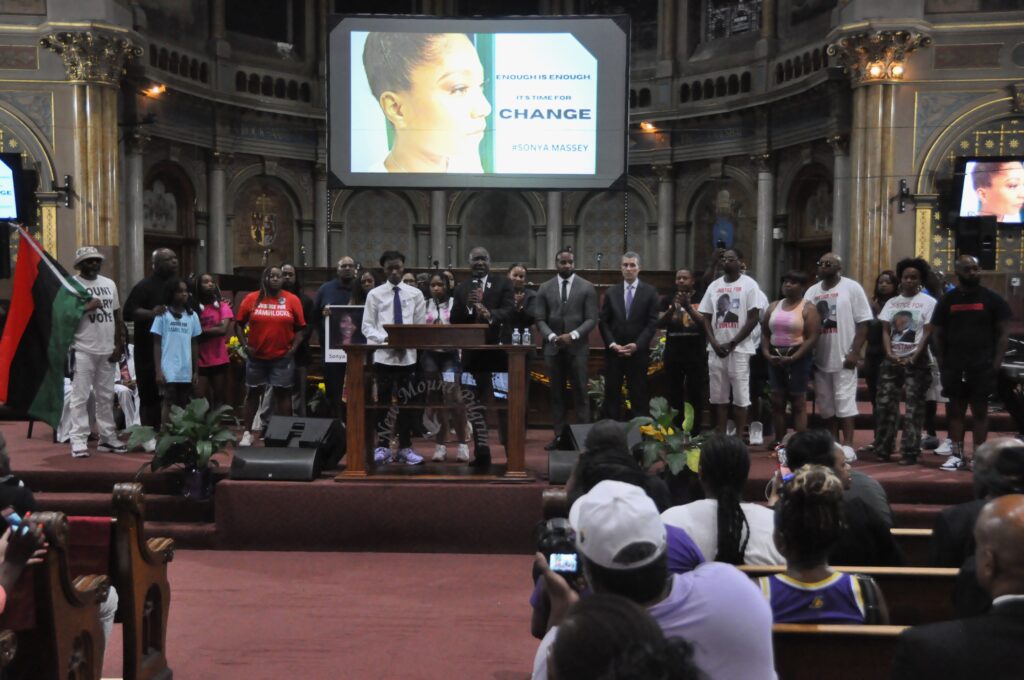
Ms. Mallory, co-founder of Until Freedom, highlighted the need to protect Black women and offered her views on the upcoming national election. “We are smarter than they think. They think that—we got an arrest—that we will go home. We’ve seen fired cops, we’ve seen arrests and we’ve also seen movements in support of officers that ultimately helped them to be released early or not in prison at all,” said Ms. Mallory.
“There is a sick trend happening across this nation of Black women being killed in their homes,” and she turned her comments toward the presidential election. Ms. Mallory organized some 35 communities across the country, on July 28, as part of a nationwide day of mourning for Sonya Massey. There have been demonstrations and vigils in New York; Oakland, California; Chicago; Atlanta; Norfolk, Virginia, and other cities.
While acknowledging her excitement over the Kamala Harris presidential campaign that could put the first woman at the head of the United States, Ms. Mallory reminded the crowd of the importance of making demands and she emphasized that it’s time to make another push for the George Floyd Justice in Policing Act. “It is okay for us to demand that we get what we need to be protected in this country,” she said.
Sonya Massey’s mother, Donna Massey, and her two teenage children also attended the New Mount Pilgrim gathering. Also present was the family of Jacob Blake, who was shot and paralyzed by a police officer in Kenosha, Wisconsin, nearly four years ago; the family of D’vontaye L. Mitchell who died after being held down by four security guards outside a hotel in Milwaukee on June 30 and several other families with similar tragic stories.
“I had to be here to embrace the father and continue this fight for justice. This whole justice system needs to be brought to a halt and rebuilt for something that works for us,” said Cephus “Uncle Bobby” X. He’s the uncle of Oscar Grant III, a 22-year-old Black man, who was killed by BART Police Officer Johannes Mehserle in Oakland, California, during the early morning hours of New Year’s Day in 2009.
More events by various organizations were planned at Final Call press time.












